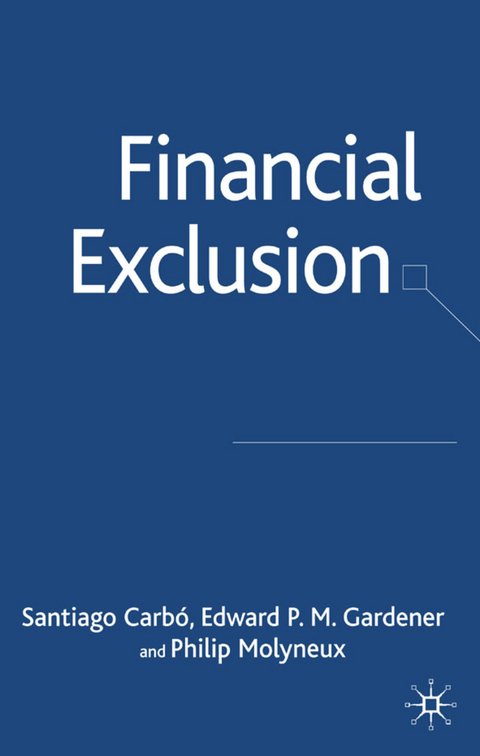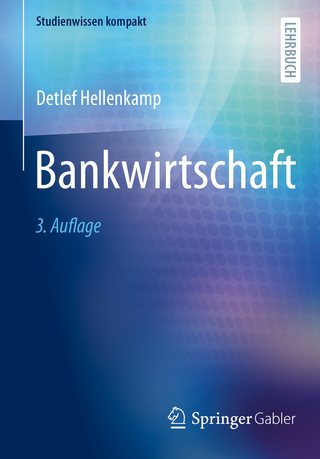
Financial Exclusion
Palgrave Macmillan (Verlag)
978-1-4039-9051-8 (ISBN)
Author Philip Molyneux: Professor Philip Molyneux is Dean of the College of Business, Law, Education and Social Science, and Professor of Banking and Finance at Bangor University, UK. His mian area of research is on structure and efficiency of banking markets and he has published widely in this area. He has also published a variety of texts on banking areas and acted as a consultant to: New York Federal Reserve Bank, the World Bank, the European Commission, the UK Treasury, Citibank Private Bank, Barclays Wealth, McKinsey & co, Credit Suisse and various other international banks and consulting firms.
List of Tables List of Figures Glossary of Acronyms PART 1: INTRODUCTION Aims and Objectives PART 2: NATURE, CONSEQUENCES AND POLICY REACTIONS: AN OVERVIEW Introduction Nature and Causes The Financially Excluded Consequences of Financial Exclusion US Experiences Responding to Financial Exclusion Conclusions PART 3: UK EXPERIENCES Introduction Financial Exclusion in the UK and the Nature of Excluded Groups Background and Types of Indicators Why is Financial Exclusion Occurring in the UK? Excluded Groups and Products Barriers to Financial Inclusion Consequences of Financial Exclusion PART 4: TACKLING FINANCIAL EXCLUSION IN THE UK Introduction Government and Financial Sector Partnership Universal Banking and Basic Banking Services Promoting Financial Literacy and Closing the Information Gap Tailoring Products and Strategies Other Institutional Arrangements SMEs and Micro Credit (Microfinance) Regulation and Financial Exclusion Conclusions PART 5: FINANCIAL EXCLUSION IN THE US Introduction Nature and Extent of the Problem Causes and Consequences Repsonses to Financial Exclusion in the US A Note on Select Bank Trends and Development Conclusion: Bank Strategic Implications PART 6: FINANCIAL EXCLUSION IN EUROPE Introduction Policy and Strategic Context Select Comparative Data Responding to Financial Exclusion in Europe Market: Spain, Greece, Ireland and Italy Voluntary Role of Banks: France, Germany and Belgium Government as Mediator: The UK and the Attempt in France Government as Legislator: France, Portugal and Sweden Conclusions PART 7: EUROPEAN POLICY ON FINANCIAL EXCLUSION AND BANK STRATEGIES Introduction Market Context and European Policy Responses Historical and Institutional Settings Policy Responses to Financial Exclusion Bank Strategies and Products The Contribution to Economic Theory Conclusion PART 8: FINANCIAL EXCLUSION IN DEVELOPING COUNTRIES Introduction Features of Financial Exclusion in Developing Countries Rural Economies and Financial Underdevelopment Exclusion and Financial Development Financial Underdevelopment and the Finance-growth nexus Financial Development is Pro-poor Mechanisms of Financial Inclusiuon in Developing Countries: Informal Financial Networks and Microfinance Rotating Saving and Credit Associations (ROSCAs) The Microfinance Revolution A Note on the Microfinance Experience in Bolivia Development of Formal Intermediaries: Some Policy Lessons Conclusions PART 9: FINANCIAL EXCLUSION - AREAS FOR FURTHER STUDY Introduction Areas for Further Study References
| Erscheint lt. Verlag | 11.5.2005 |
|---|---|
| Reihe/Serie | Palgrave Macmillan Studies in Banking and Financial Institutions |
| Zusatzinfo | XVI, 184 p. |
| Verlagsort | Gordonsville |
| Sprache | englisch |
| Maße | 140 x 216 mm |
| Themenwelt | Wirtschaft ► Betriebswirtschaft / Management ► Finanzierung |
| Betriebswirtschaft / Management ► Spezielle Betriebswirtschaftslehre ► Bankbetriebslehre | |
| ISBN-10 | 1-4039-9051-4 / 1403990514 |
| ISBN-13 | 978-1-4039-9051-8 / 9781403990518 |
| Zustand | Neuware |
| Haben Sie eine Frage zum Produkt? |
aus dem Bereich


